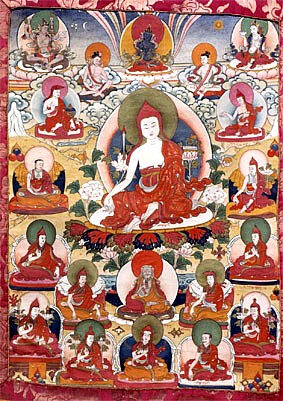Khyungpo Naljor: Difference between revisions
Jump to navigation
Jump to search
(Use TBRC template.) |
(Tibetan.) |
||
| Line 1: | Line 1: | ||
[[Image:KhyungpoNaljor.jpg|frame|Khyungpo Naljor]] | [[Image:KhyungpoNaljor.jpg|frame|Khyungpo Naljor]] | ||
'''Khyungpo Naljor''' ( | '''Khyungpo Naljor''' (Tib. ཁྱུང་པོ་རྣལ་འབྱོར་, Wyl. ''khyung po rnal 'byor'') (c. 1050-1140) or (990-1139) — the founder of the [[Shangpa Kagyü]] tradition. | ||
He took full ordination with [[Geshe Langri Tangpa]] and travelled seven times to India from Tibet, bringing back many teachings from masters such as [[Niguma]], [[Sukhasiddhi]], Rahulaguptavajra, [[Maitripa]] and Vajrasana or Abhaya. He made his seat in a place called Shang in the [[Tsang]] region of Tibet. He was therefore known as the Lama Shangpa. He founded over one hundred monasteries in Tibet and taught tirelessly, manifesting many miracles. He is said to have lived for 150 years. | He took full ordination with [[Geshe Langri Tangpa]] and travelled seven times to India from Tibet, bringing back many teachings from masters such as [[Niguma]], [[Sukhasiddhi]], Rahulaguptavajra, [[Maitripa]] and Vajrasana or Abhaya. He made his seat in a place called Shang in the [[Tsang]] region of Tibet. He was therefore known as the Lama Shangpa. He founded over one hundred monasteries in Tibet and taught tirelessly, manifesting many miracles. He is said to have lived for 150 years. | ||
Revision as of 04:02, 28 April 2017

Khyungpo Naljor (Tib. ཁྱུང་པོ་རྣལ་འབྱོར་, Wyl. khyung po rnal 'byor) (c. 1050-1140) or (990-1139) — the founder of the Shangpa Kagyü tradition.
He took full ordination with Geshe Langri Tangpa and travelled seven times to India from Tibet, bringing back many teachings from masters such as Niguma, Sukhasiddhi, Rahulaguptavajra, Maitripa and Vajrasana or Abhaya. He made his seat in a place called Shang in the Tsang region of Tibet. He was therefore known as the Lama Shangpa. He founded over one hundred monasteries in Tibet and taught tirelessly, manifesting many miracles. He is said to have lived for 150 years.
Further Reading
- Matthew Kapstein, 'Chronological Conundrums in the Life of Khyung po rnal ’byor: Hagiography and Historical Time', JIATS 1